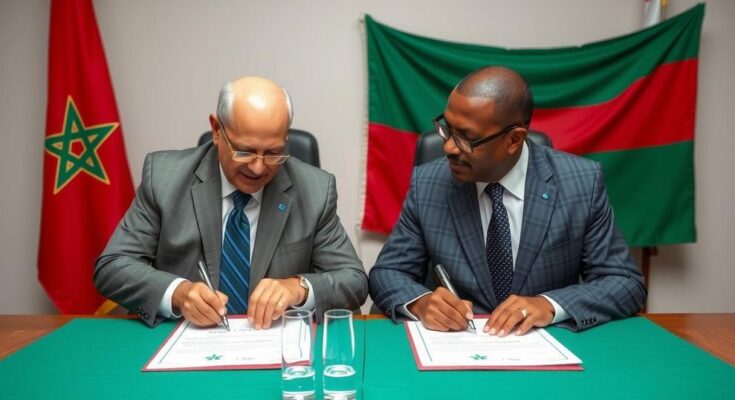Morocco and Zambia signed seven cooperation agreements in Laayoune, focusing on tourism, renewable energy, vocational training, justice, investment, and higher education. This move seeks to strengthen their bilateral ties against the backdrop of the Sahara dispute, with both nations emphasizing regional autonomy and international collaboration. Zambian Foreign Minister Haimbe expressed support for Morocco’s sovereignty plan in his discussions with Moroccan officials.
On Friday, Morocco and Zambia solidified their diplomatic relations by signing seven comprehensive cooperation agreements in Laayoune, a city situated within the disputed Sahara region. These agreements, which span various sectors including tourism, renewable energy, vocational training, justice, investment, and higher education, were established during the inaugural session of the Joint Cooperation Commission. This session was co-chaired by Moroccan Foreign Minister Nasser Bourita and Zambian Foreign Minister Mulambo Haimbe, as reported by the Maghreb Arabe Press (MAP).
The two ministers highlighted the importance of creating a multifaceted partnership that aligns with the aspirations of Morocco’s King Mohammed VI and Zambia’s President Hakainde Hichilema. Minister Haimbe presented a written communication from President Hichilema to King Mohammed VI, which underscored Zambia’s acknowledgment of Morocco’s autonomy plan for the Sahara. Minister Haimbe stated, “The growing international support for the plan and the leadership of King Mohammed VI in advancing Moroccan sovereignty.”
This event occurs amidst the ongoing territorial dispute regarding the Sahara. Morocco seeks to establish regional autonomy while the Polisario Front, with the support of Algeria, advocates for a referendum on self-determination. The newly established cooperation agreements reflect both nations’ commitment to enhancing bilateral relations and addressing mutual regional and global issues. Minister Haimbe also expressed support for UN-led endeavors aimed at achieving a “realistic, practical, and sustainable solution” to the Sahara conflict.
Ultimately, these agreements are anticipated to bolster economic, social, and educational collaboration between Morocco and Zambia, thereby reinforcing their partnership within the region.
Morocco and Zambia’s recent signing of cooperation agreements marks a significant development in international relations regarding the disputed Sahara territory. Morocco contends that regional autonomy under its sovereignty is the desired approach for the region, while the Polisario Front seeks a referendum on independence, often supported by Algeria. This geopolitical backdrop highlights the complexities surrounding these nations’ collaborations and their implications for regional stability. The agreements signed in Laayoune serve as a testament to Morocco’s ongoing push for international acceptance of its stance over the Sahara, contrasted with Zambia’s support for these distinct efforts.
In conclusion, the cooperation agreements established between Morocco and Zambia represent a significant advancement in their bilateral relations amidst a complex geopolitical landscape. The commitments made in critical areas such as renewable energy and education not only aim to strengthen their partnership but also reflect a shared vision for regional stability and development. As both nations navigate their diplomatic interactions, the shared endorsements regarding the Sahara conflict underscore the diplomatic significance of their agreements.
Original Source: newscentral.africa




